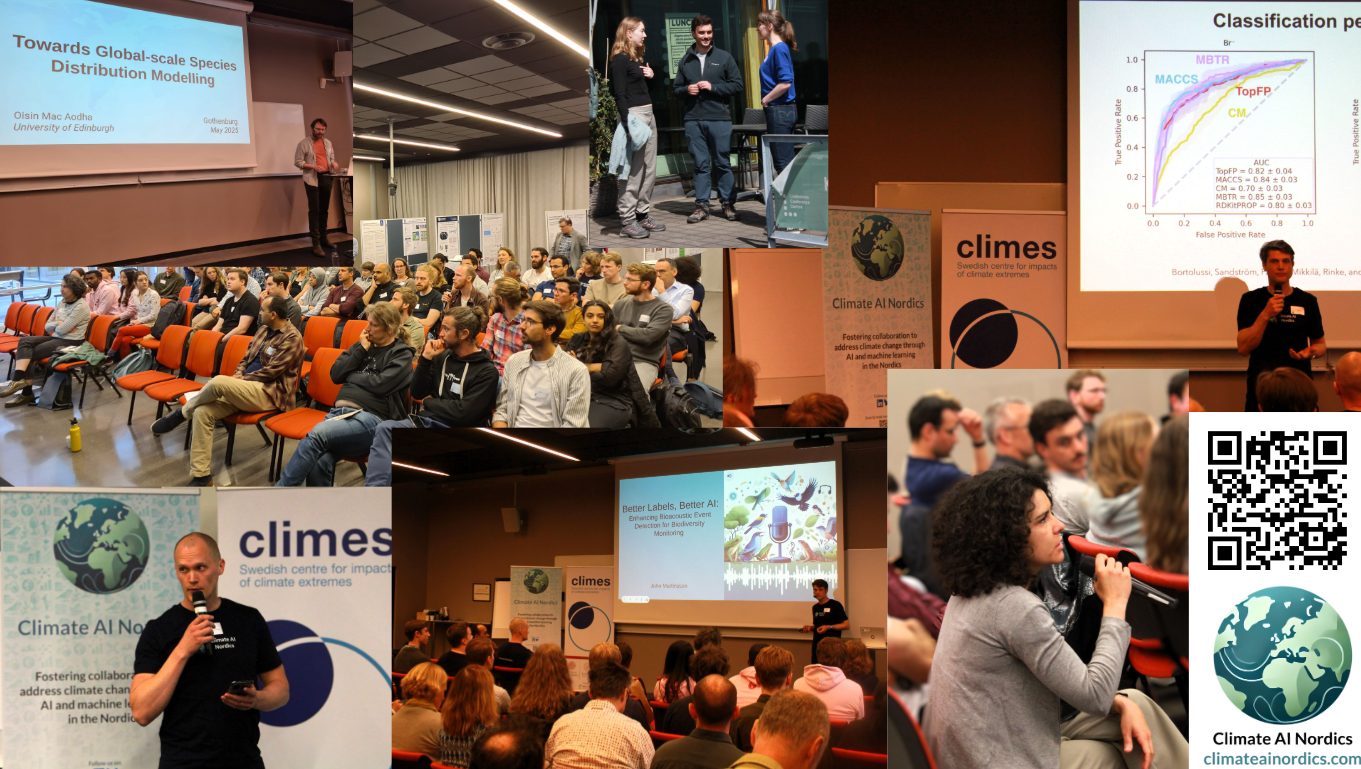Celebrating one year with Climate AI Nordics!

Image credits: Sakıp Murat Yalçın
One year ago today we started Climate AI Nordics, and we have been amazed at what we have achieved together with you all during this first year. We have so far grown to almost 200 registered members, and an additional 65 supporting affiliates from outside the Nordics. Together, our members come from about 140 different organizations.
With this post we’d like to summarize some key highlights, as we look forward to another great year.
Nordic Workshop on AI for Climate Change 2025
One of the major milestones this year was our first annual Nordic Workshop on AI for Climate Change, held in Gothenburg on May 13, 2025. This full-day event gathered researchers from across the region to discuss AI’s role in biodiversity monitoring, atmospheric science, soundscapes, Earth observation, and more. If you want to read more about our first annual event, please check out this page.
Our sincere thanks go out to the speakers, attendees, and our partners at CLIMES for co-arranging the event. Information on next year’s annual Nordic Workshop on AI for Climate Change will come in the near term!
AICC: AI for Climate and Conservation, accepted workshop at EurIPS 2025
Climate AI Nordics is also co-organizing the upcoming EurIPS 2025 accepted workshop AICC: AI for Climate and Conservation. This full-day event will gather researchers and practitioners working at the intersection between AI, climate and/or conservation. Invited speakers are Philippe Ciais (LCSE), Sagar Vaze (Mistral AI), Verena Griess (ETH Zurich), Natalie Ahlstrand (University of Copenhagen), and Drew Purves (Google DeepMind). We’re grateful for a successful collaboration with and financial support from Pioneer Centre for Artificial Intelligence!
The Call for Participation is now closed, and we thank all authors for their submitted works. Final decisions on accepted works will come shortly (thank you all reviewers for your important contributions!), and we’re looking forward to meeting you in Copenhagen in December!
Webinars
Our webinars have served as a vibrant platform for researchers working at the intersection of artificial intelligence and climate action. We have heard from leading voices on topics as diverse as weather forecasting, biodiversity monitoring, and equitable AI for conservation. We thank RISE Research Institutes of Sweden and Learning Machines Seminars for the collaboration. Below we briefly mention some of the talks given in the past year.
Joel Oskarsson (Linköping University) introduced cutting-edge machine learning models that are reshaping weather prediction, including graph-based approaches and probabilistic forecasting. Alp Kucukelbir (Columbia University / Fero Labs) gave a systems-level talk on AI’s role in climate change mitigation, highlighting industrial applications and the challenges of trust and scale. Alireza Taheri Dehkordi (Lund University) showed how satellite data and AI can help estimate water quality, a vital issue as global water resources become more strained.
Benjamin Cretois (NINA) shared experiences from the TABMON project, where acoustic sensors and deep learning models are being deployed across Europe for large-scale biodiversity monitoring. Lily Xu (Columbia University) brought powerful insights into real-world AI deployment for wildlife protection, blending reinforcement learning, causal inference, and field experience. And Peter Dueben (ECMWF) capped off the season with a sweeping vision of AI in Earth system modelling, covering the shift from traditional physics-based forecasts to foundation models.
John Martinsson (RISE & Lund University) presented new approaches to reduce the cost and improve the quality of annotating local structures in data. His work showed how adaptive labeling techniques can help make machine learning more efficient and scalable—especially relevant for biodiversity audio datasets. Ghjulia Sialelli (ETH Zurich) gave a presentation on the use of deep learning for estimating forest above-ground biomass (AGB) from high-resolution, multi-modal satellite data paired with GEDI measurements, introducing a new machine learning-ready dataset and baseline models. Her talk also covered ongoing improvements, challenges, and future directions toward global AGB mapping and uncertainty estimation. Commented out due to lack of space.
Georges Le Bellier (Conservatoire National des Arts et Métiers) presented work on two complementary approaches for making Earth observation models more robust and adaptable: generative domain adaptation and geospatial foundation models. He introduced FlowEO, a task-agnostic, flow-based method for unsupervised domain adaptation, and PANGAEA, a global benchmark that standardizes the evaluation of geospatial foundation models across diverse conditions and modalities. Sigrid Passano Hellan (NORCE Research & Bjerknes Centre for Climate Research) gave a talk on hyperparameter tuning and Bayesian optimisation as ways to automate and simplify machine learning model setup, making ML more accessible for climate applications. She also highlighted how transfer learning can accelerate optimisation and reviews real-world uses of Bayesian optimisation in climate research, including material discovery, renewable energy control, and environmental monitoring.
As a last example of the diverse talks given during the past year, Sebastian Hafner (RISE) presented work on how deep learning is transforming urban mapping and change detection using multi-modal Earth observation data. He talked about addressing key challenges such as data integration, limited labels, and geographic transferability, and highlighted the IDEAMAPS Data Ecosystem as a community-driven effort advancing DL-based mapping of urban deprivation and disaster impacts.
We thank every speaker for sharing their research, and every participant who joined the conversation.
Monthly newsletters, social media presence, and community updates
Beyond the webinars, we’ve also published a series of monthly newsletters that document our journey and spotlight work and members from the community. Since October 2024, we’ve shared featured research on thermal inequality, audio biodiversity monitoring, deep learning for remote sensing, and much more. We’ve reported on interviews in national media, partnerships with organizations (see more below), and the launch of our website, LinkedIn with 1250+ followers so far, BlueSky, and Slack workspaces.
Our newsletters aim to inform and connect—amplifying your successes, sharing calls for collaboration, and bringing visibility to impactful AI-for-climate work across the Nordics. Since June, we also include a list of open positions for researchers and practitioners in the field in the Nordics; please get in touch if you want us to post about your job openings!
Partnerships
Within our first year we also established five partnerships with diverse organizations: The Swedish Centre for Impacts of Climate Extremes (climes), AfriClimate AI, The Global Wetland Center, Klimatkollen, and The ELLIS Machine Learning for Earth and Climate Sciences Program.
We’re also grateful to RISE Research Institutes of Sweden for sponsoring our work within Climate AI Nordics!
If you’re interested in discussing partnerships and/or sponsorships, please don’t hesitate to get in touch!
Core team
Already in the early days of Climate AI Nordics, we established a core team of 10 people from 4 different Nordic countries (and we’d be happy to include core team people also from Iceland; please get in touch!). We’re thankful for all the work done by the core team regarding the planning and maintenance of Climate AI Nordics. This includes planning events, collecting information for and running the webpage, taking care of our social media channels, and compiling and editing newsletters.
Concluding remarks
Thank you for being part of this vibrant and growing community. We are proud of what we’ve built together—and excited for what’s ahead of us in the coming year!
